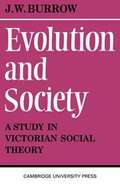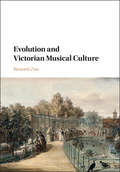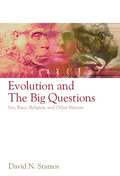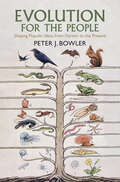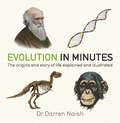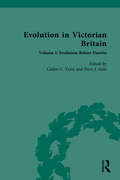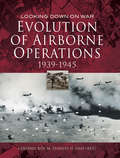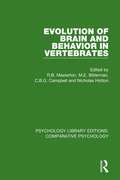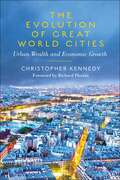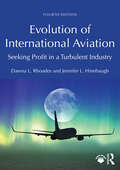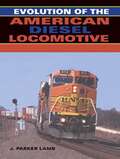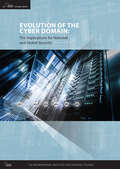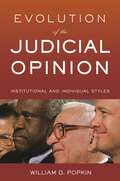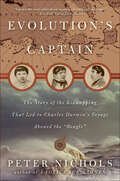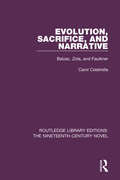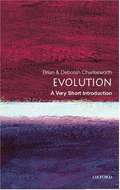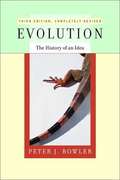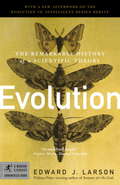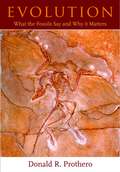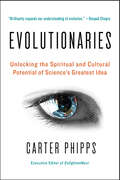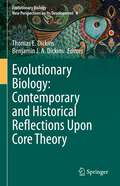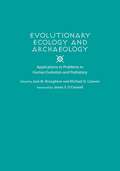- Table View
- List View
Evolution and Human Destiny
by Fred Kohler"Evolution and Human Destiny" is a methodical examination of the evolution of living matter in general and the development of man and human society in particular. Raising pertinent questions on whether the road of human development will lead steadily upward, or whether it will be interrupted by severe setbacks with all the attendant sufferings for mankind.
Evolution and Society: A Study in Victorian Social Theory
by J. W. BurrowIn this 1966 text Dr Burrow investigates the reasons why Victorian pioneers of social science were habitually approaching the study of other societies with largely positivistic and evolutionary methodologies. As a result of this, anthropology appeared to be seeking affirmation of assumed laws and stages of progress, rather than looking to appreciate and understand other societies in terms of their own uniqueness and functionality. Here, the author not only studies Victorian thought on evolution in general, but also seeks to contextualise those ideas which are often classified as exclusively Darwinist within the studies and writings of other leading figures in Victorian science and social science, whose works often predate The Origin of the Species. His book also makes an incredibly important contribution to the ways in which ideas on evolution and society operated within the framework of general Victorian thought and assumption.
Evolution and Victorian Musical Culture
by Bennett ZonThis engaging book explores the dynamic relationship between evolutionary science and musical culture in Victorian Britain, drawing upon a wealth of popular scientific and musical literature to contextualize evolutionary theories of the Darwinian and non-Darwinian revolutions. Bennett Zon uses musical culture to question the hegemonic role ascribed to Darwin by later thinkers, and interrogates the conceptual premise of modern debates in evolutionary musicology. Structured around the Great Chain of Being, chapters are organized by discipline in successively ascending order according to their object of study, from zoology and the study of animal music to theology and the music of God. Evolution and Victorian Musical Culture takes a non-Darwinian approach to the interpretation of Victorian scientific and musical interrelationships, debunking the idea that the arts had little influence on contemporary scientific ideas and, by probing the origins of musical interdisciplinarity, the volume shows how music helped ideas about evolution to evolve.
Evolution and the Big Questions: Sex, Race, Religion, and Other Matters
by David N. StamosThis provocative text considers whether evolutionary explanations can be used to clarify some of life’s biggest questions. Examines topics of race, sex, gender, the nature of language, religion, ethics, knowledge, consciousness and ultimately, the meaning of life Each chapter presents a main topic, together with discussion of related ideas and arguments from various perspectives Addresses questions such as: Did evolution make men and women fundamentally different? Is the concept of race merely a social construction? Is morality, including universal human rights, a mass delusion? Can religion and evolution really be harmonized? Does evolution render life meaningless? Written in a clear and informative style, with helpful references for further reading and research
Evolution for the People: Shaping Popular Ideas from Darwin to the Present
by Peter J. BowlerFrom Darwin's The Origin of Species to the twenty-first century, Peter Bowler reinterprets the long Darwinian Revolution by refocussing our attention on the British and American public. By applying recent historical interest in popular science to evolutionary ideas, he investigates how writers and broadcasters have presented both Darwinism and its discontents. Casting new light on how the theory's more radical aspects gradually grew in the public imagination, Evolution for the People extends existing studies of the popularization of evolutionism to give a more comprehensive picture of how attitudes have changed through time. In tracing changes in public perception, Bowler explores both the cultural impact and the cultural exploitation of these ideas in science, religion, social thought and literature.
Evolution in Minutes (IN MINUTES)
by Darren NaishHow did life begin? What is the theory of evolution and is it proven? Are we really descended from apes? And has evolution stalled or is humanity just a step on the way to more advanced forms of life?Through 200 mini-essays, expert palaeontologist Darren Naish answers these and many other fundamental questions on the most controversial topic of all. From the theories of Charles Darwin and the Survival of the Fittest to cutting-edge research on consciousness and artificial life, he explains where we came from, how we became human, and what might happen to us next. Immense in scope, and with 200 informative images and diagrams, Evolution in Minutes concisely covers the concepts, rival theories, history and politics of evolution, as well as explaining the development of life across deep time as revealed by the fossil record, from the earliest bacteria via dinosaurs and Neanderthals to humankind - and beyond.
Evolution in Victorian Britain: Volume I: Evolution Before Darwin
by Piers J. Hale Caden C. TestaThis volume provides the readers with a broad but detailed consideration of a wide array of transmutationist thinkers who published before Darwin. Highlighting some of those whom Darwin later acknowledged as well as number he chose not to, readers are shown that the notion that none of these earlier thinkers offered a well-developed or workable theory of evolution is untenable once we read their own words. Further, we will quickly see that transmutation, or the ‘developmental hypothesis’ as it was also sometimes called, had a wide audience across the period under consideration.Scholars such as Adrian Desmond have already drawn attention to the political radicals in the London and Edinburgh medical schools who embraced the transmutationist ideas of the French anatomists Etienne Geoffroy Saint Hilaire and the naturalist and zoologist Jean-Baptiste Lamarck, and the historians John van Wyhe and Roger Cooter have highlighted the materialist naturalism of phrenologists whose work was so amenable to developmentalist thinking. Paul Elliott has drawn our attention to the “Derbyshire Darwinians,” who championed the transmutationist and egalitarian Enlightenment ideas of Erasmus Darwin, Charles Darwin’s grandfather — as well as the extent to which the Derby Philosophical Society was a breeding ground for this kind of thinking. It was here, for instance, that the young radical journalist Herbert Spencer spent many hours in his formative years.Thus, while Darwin was quietly working away at his big species book, transmutation was being discussed and debated, written about, and advocated across the nation. The book he eventually published in 1859, On the Origin of Species, was thus a contribution to an already very lively, controversial, contested, and ongoing debate. However, Darwin had not intended to published Origin as we know it; it is in fact only what he called a brief abstract of the detailed multi-volume work he had initially had in mind. It was upon receipt of a short essay from the naturalist and collector Alfred Russel Wallace that Darwin was pressed to publish. In this short paper Wallace had quite independently arrived at a theory of species development that was remarkably similar to that which Darwin had been working on for some twenty years.
Evolution of Airborne Operations, 1939–1945 (Looking Down on War)
by Colonel Roy M. Stanley IIThe development of air transport in the early 20th Century led military strategists to examine the concept of inserting light infantry at key points behind enemy lines by air landing and air drop.The Germans were first off-the-mark with assaults in Norway and at Eben Emael in 1940. Crete saw a larger scale attack but while ultimately victorious the cost of men and equipment involved deterred any further Axis operation.The Allies on the other hand developed the concept dramatically with the large scale operation HUSKY in Sicily. While only partially successful there was massive loss of life and aircraft airborne operations were a key, if relatively minor, element of Op OVERLORD The D-Day Invasion.The most famous airborne operation was the large scale but ill-fated MARKET GARDEN. Almost successful the Arnhem battle goes down as a heroic defeat. The culmination of WWII airborne operations was the multi-division Rhine Crossing VARSITY.Expert author and collector Roy Stanley traces the history of airborne landings in words and pictures.
Evolution of Brain and Behavior in Vertebrates (Psychology Library Editions: Comparative Psychology)
by R. B. Masterton M. E. Bitterman C.B.G. Campbell Nicholas HottonOriginally published in 1976, the object of this volume was to present a relatively up-to-date overview of what was known, what was suspected, and what remained to be discovered concerning the general question of the evolution of the vertebrate brain and behaviour, and to present a list of references for those who wanted to delve deeper into one or another aspect of the problem. Accordingly, it contains chapters by palaeontologists, sensory morphologists and physiologists, comparative neurologists and comparative psychologists. The chapters are arranged in a sequence loosely approximating the order in which the various animals, brain structures, or behaviour first appeared. Therefore, the chapters fall naturally into sections, each section directed to a group of vertebrates, beginning with those which have very remote common ancestry and progressing to those with more recent common ancestry with mankind.
Evolution of Great world Cities
by Christopher KennedySome cities seem destined to become major financial capitals, yet never do--Seville, for instance, was the centre of Spain's opulent New World Empire, but failed to become a financial metropolis. Others, like former colonial backwater Hong Kong, defy the odds by growing into major trading centres. What are the key factors distinguishing those cities that become wealthy from those that don't? Christopher Kennedy illuminates how geography, technology, and especially the infrastructure of urban economies allow cities to develop and thrive.The Evolution of Great World Cities unfolds through the tales of several urban centres--including Venice, Amsterdam, London, and New York City--at key junctures in their histories. Kennedy weaves together significant insights from urbanists such as Jane Jacobs and economists such as John Maynard Keynes, drawing striking parallels between the functioning of ecosystems and of wealthy capitals. The Evolution of Great World Cities offers an accessible introduction to urban economies that 'will change the way you think about cities.'
Evolution of International Aviation: Seeking Profit in a Turbulent Industry
by Dawna L. Rhoades Jennifer L. HinebaughThe purpose of this book is twofold. First, it lays out the forces that shaped the international aviation industry and that changed all the rules in the drive for liberalization. Second, it looks at the many interesting and difficult choices ahead that the airline industry in general and the international aviation industry in particular face. These choices include many dichotomies: pulling back from the trend toward liberalization or embracing the liberalization trend, merging in search of profitability or fragmenting the industry in search of economies. These possible futures are explored, including the pros and cons of each future from a national, consumer, employer, and employee perspective. Evolution of International Aviation has been substantially revised to place the triple crises – 9/11, the 2008 Global Financial Crisis, and the COVID-19 pandemic – into context with the declared new Golden Age of 2018 (A4A), Brexit, renewed government aid around the globe, and the Ukraine conflict. It includes a new chapter on safety and security that will start with processes and technology introduced after 9/11 (such as the 24-hour rule, known shippers, and Global Entry programs) and end with recent biometrics and digital identity. As with the previous three editions, this fourth edition of Evolution of International Aviation reviews the historical development of the international aviation system. From this foundation it then provides an updated and expanded account of the current state of the aviation and aerospace industry, including profitability, consolidation, and merger activity. The book includes coverage of the industry segments – airlines, air cargo, and manufacturing – to include the emerging commercial space sector. It also emphasizes the relationship between aviation and the political process, exploring the sustainability of this mode of transportation in a world of climate change, high oil prices, and political instability. Because this book is intended for both the interested amateur and the more serious student, references are provided in the text and at the end of each chapter to allow for further in-depth study.
Evolution of the American Diesel Locomotive (Railroads Past and Present)
by J. Parker Lamb“An important contribution to railroad technological history. The book’s strength is the author’s mastery of the mechanical details.” —Mark Reutter, editor, Railroad HistoryThe diesel locomotive sent shock waves through rigid corporate cultures and staid government regulators. For some, the new technology promised to be a source of enormous profits; for others, the railroad industry seemed a threat to their very livelihoods. Evolution of the American Diesel Locomotive introduces the reader to the important technological advances that gave rise to diesel engines, examining not only their impact on locomotive design, but also their impact on the economic and social landscapes. J. Parker Lamb describes the development of these technologies, allowing the reader to fully understand how they were integrated and formed a commercially successful locomotive. Like its companion volume, Perfecting the American Steam Locomotive (IUP, 2003), this book emphasizes the role of the leading engineers whose innovations paved the way for critical breakthroughs. Rail fans will appreciate this authoritative work.“A host of books and articles have touched on various aspects of this ongoing story over the years, but none tell the story with the completeness and superb clarity found here.” —Michigan Railfan“Lamb provides the reader with detailed descriptions of every generation of diesel locomotive along with a generous supply of excellent photographs.” —Technology and Culture
Evolution of the British Party System: 1885-1940
by Robert C. SelfBy the end of the nineteenth century, reform and development of the British electoral system had inaugurated a new style of mass politics which fundamentally transformed the face of the British party system. This book traces the evolution of recognisably modern parties from their roots in the 1880s through half a century of dramatic change in organisational structure, electoral competition and constitutional thought.In the House of Commons the Labour Party replaced the Liberals as the radical answer to the Conservative Party. In the country at large the complex web of Victorian social, regional and religious allegiances gave way to a cruder but more dynamic model of modern political loyalties.The transformation at Westminster and in the constituencies is surveyed in relation to changes to the franchise (including the vote for women), class consciousness, political organisation and doctrine. The comprehensive account explains the varying fortunes of the parties in the face of mass democracy, collectivism, the First World War and economic uncertainty. It also provides a critical insight into the debates and conflicts of interpretation which surround this pivotal period in British political history.
Evolution of the Cyber Domain: The Implications for National and Global Security
by The International Institute for Strategic StudiesCyber security has become a focal point for conflicting domestic and international interests, and increasingly for the projection of state power. The military utility of the cyber domain is linked to the economic and social potential of information and communications technologies (ICTs), while technologies with military and national-security applications have become essential to the conduct of modern life.In light of this, Evolution of the Cyber Domain provides a holistic review of the strategic, operational and technical issues at the centre of the international cyber-security debate. The Dossier charts and contextualises the key developments and trends that have shaped the cyber domain since the 1950s. As well as tracking the events and decisions underlying the military potential of ICTs, it examines the issues and policies that affect global governance of the internet.The Dossier analyses:• The geopolitics of international cyber security and technological development.• The challenges of creating methods for managing conflict within the cyber domain based on international law.• The tension between issues of privacy, freedom of information and national security.• Intelligence as a state practice in peace and war.• The development and use of cyber military capabilities.The Dossier is an important point of reference for further research and analysis on complex cyber-security issues, and it provides a series of insights into national positions, as well as regional and global agreements and policies. Evolution of the Cyber Domain is a useful resource for readers who seek a comprehensive picture of cyber affairs, and who wish to understand the social, economic and politico-military challenges that have guided the development and use of ICTs in the past six decades. By summarising the ways in which governments are addressing these challenges at the strategic level, it helps prepare decision-makers and researchers involved in the formulation of cyber-security policy, strategy and analysis. The Dossier also contains a glossary of the key terms and concepts in the cyber-security dialogue.
Evolution of the Judicial Opinion: Institutional and Individual Styles
by William D. PopkinIn this sweeping study of the judicial opinion, William D. Popkin examines how judges' opinions have been presented from the early American Republic to the present. Throughout history, he maintains, judges have presented their opinions within political contexts that involve projecting judicial authority to the external public, yet within a professional legal culture that requires opinions to develop judicial law through particular institutional and individual judicial styles.Tracing the history of judicial opinion from its roots in English common law, Popkin documents a general shift from unofficially reported oral opinions, to semi-official reports, to the U.S. Supreme Court's adoption in the early nineteenth century of generally unanimous opinions. While this institutional base was firmly established by the twentieth century, Popkin suggests that the modern U.S. judicial opinion has reverted—in some respects—to one in which each judge expresses an individual point of view. Ultimately, he concludes that a shift from an authoritative to a more personal and exploratory individual style of writing opinions is consistent with a more democratic judicial institution.
Evolution of the Social Contract
by Brian SkyrmsIn this pithy and highly readable book, Brian Skyrms, a recognised authority on game and decision theory, investigates traditional problems of the social contract in terms of evolutionary dynamics. Game theory is skilfully employed to offer new interpretations of a wide variety of social phenomena, including justice, mutual aid, commitment, convention and meaning. The author eschews any grand, unified theory. Rather, he presents the reader with tools drawn from evolutionary game theory for the purpose of analysing and coming to understand the social contract. The book is not technical and requires no special background knowledge. As such, it could be enjoyed by students and professionals in a wide range of disciplines: political science, philosophy, decision theory, economics and biology.
Evolution's Captain: The Story of the Kidnapping That Led to Charles Darwin's Voyage Aboard the "Beagle"
by Peter NicholsThe story of a visionary but now forgotten English naval officer and the events without which the name Charles Darwin would be unknown to us today.Captain Robert FitzRoy’s first voyage aboard the HMS Beagle had concluded with the kidnapping of four “savages” from Tierra del Fuego. But when his plan to bring them back to England to civilize them as Christian gentlefolk backfired, the second and most famous voyage of the Beagle was born. In naval terms, this second voyage—with twenty-two-year-old Charles Darwin in tow—was a stunning scientific success. But FitzRoy, a fanatical Christian was horrified by the heretical theories Darwin began to develop. As these ideas came to influence the most profound levels of religious and scientific thinking in the nineteenth century, FitzRoy’s knowledge that he had provided Darwin the vehicle for his sacrilegious ideas propelled him irrevocably toward suicide.Praise for Evolution’s Captain“A powerful story played out against a beguiling landscape. . . . Nichols has a finely tuned sense of history.” —New York Times Book Review“A fascinating account. . . . A finely researched, engaging book.” —Atlanta Journal-Constitution“It’ll prove hard not to share [Nichols’s] fascination with how FitzRoy’s naval career inadvertently set off a scientific controversy still flaring to this day.” —Publishers Weekly
Evolution, Sacrifice, and Narrative: Balzac, Zola, and Faulkner (Routledge Library Editions: The Nineteenth-Century Novel #7)
by Carol ColatrellaFirst published in 1990. Balzac, Zola and Faulkner all drew upon the principles of evolutionary theory to represent man’s place in nature and his struggle for survival in their major series La Comèdie humaine, Rougon-Macquart and the Yoknapatawpha fiction. This book focuses on the ‘first’ novels in each author’s series (La Père Goriot, La Fortune des Rougon and Flags in the Dust) and considers how each novel relates to its series and derives a definition of the naturalistic roman-fleuve. To describe this development, the issues of how a scientific idea becomes refracted in a literary genre and how the naturalistic novel developed out of the realistic novel are considered.
Evolution: A Very Short Introduction
by Brian CharlesworthThis book covers the crucial role of evolutionary biology in transforming our view of human origins and relation to the universe, and its impact on traditional philosophy and religion. Furthermore, it explains the most important basic findings and procedures in the area, and how it has developed since the first publications of Darwin and Wallace 150 years ago.
Evolution: The History of an Idea (3rd Edition, Revised and Expanded)
by Peter J. BowlerA comprehensive and authoritative source on the development and impact of this most controversial of scientific theories. This new edition has been entirely rewritten to take account of the latest work of historians and scientists.
Evolution: The Remarkable History of a Scientific Theory (Modern Library Chronicles)
by Edward J. Larson"I often said before starting, that I had no doubt I should frequently repent of the whole undertaking." So wrote Charles Darwin aboard The Beagle, bound for the Galapagos Islands and what would arguably become the greatest and most controversial discovery in scientific history. But the theory of evolution did not spring full-blown from the head of Darwin. Since the dawn of humanity, priests, philosophers, and scientists have debated the origin and development of life on earth, and with modern science, that debate shifted into high gear.In this lively, deeply erudite work, Pulitzer Prize-winning science historian Edward J. Larson takes us on a guided tour of Darwin's "dangerous idea," from its theoretical antecedents in the early nineteenth century to the brilliant breakthroughs of Darwin and Wallace, to Watson and Crick's stunning discovery of the DNA double helix, and to the triumphant neo-Darwinian synthesis and rising sociobiology today.Along the way, Larson expertly places the scientific upheaval of evolution in cultural perspective: the social and philosophical earthquake that was the French Revolution; the development, in England, of a laissez-faire capitalism in tune with a Darwinian ethos of "survival of the fittest"; the emergence of Social Darwinism and the dark science of eugenics against a backdrop of industrial revolution; the American Christian backlash against evolutionism that culminated in the famous Scopes trial; and on to today's world, where religious fundamentalists litigate for the right to teach "creation science" alongside evolution in U.S. public schools, even as the theory itself continues to evolve in new and surprising directions.Throughout, Larson trains his spotlight on the lives and careers of the scientists, explorers, and eccentrics whose collaborations and competitions have driven the theory of evolution forward. Here are portraits of Cuvier, Lamarck, Darwin, Wallace, Haeckel, Galton, Huxley, Mendel, Morgan, Fisher, Dobzhansky, Watson and Crick, W. D. Hamilton, E. O. Wilson, and many others. Celebrated as one of mankind's crowning scientific achievements and reviled as a threat to our deepest values, the theory of evolution has utterly transformed our view of life, religion, origins, and the theory itself, and remains controversial, especially in the United States (where 90% of adults do not subscribe to the full Darwinian vision). Replete with fresh material and new insights, Evolution will educate and inform while taking readers on a fascinating journey of discovery.From the Hardcover edition.
Evolution: What the Fossils Say and Why It Matters
by Donald R. ProtheroOver the past twenty years, paleontologists have made tremendous fossil discoveries, including fossils that mark the growth of whales, manatees, and seals from land mammals and the origins of elephants, horses, and rhinos. Today there exists an amazing diversity of fossil humans, suggesting we walked upright long before we acquired large brains, and new evidence from molecules that enable scientists to decipher the tree of life as never before. The fossil record is now one of the strongest lines of evidence for evolution. In this engaging and richly illustrated book, Donald R. Prothero weaves an entertaining though intellectually rigorous history out of the transitional forms and series that dot the fossil record. Beginning with a brief discussion of the nature of science and the "monkey business of creationism," Prothero tackles subjects ranging from flood geology and rock dating to neo-Darwinism and macroevolution. He covers the ingredients of the primordial soup, the effects of communal living, invertebrate transitions, the development of the backbone, the reign of the dinosaurs, the mammalian explosion, and the leap from chimpanzee to human. Prothero pays particular attention to the recent discovery of "missing links" that complete the fossil timeline and details the debate between biologists over the mechanisms driving the evolutionary process. Evolution is an absorbing combination of firsthand observation, scientific discovery, and trenchant analysis. With the teaching of evolution still an issue, there couldn't be a better moment for a book clarifying the nature and value of fossil evidence. Widely recognized as a leading expert in his field, Prothero demonstrates that the transformation of life on this planet is far more awe inspiring than the narrow view of extremists.
Evolutionaries: Unlocking the Spiritual and Cultural Potential of Science's Greatest Idea
by Carter PhippsThis survey of science, religion and philosophy by an Integral thought leader “brilliantly expands our understanding of evolution” (Deepak Chopra).Blending cutting-edge ideas with spiritual insights, Evolutionaries is the first popular presentation of an emerging school of thought called “evolutionary spirituality.” Carter Phipps, the former executive editor of EnlightenNext magazine, asserts that evolution is not only a scientific but also a spiritual idea in a book whose message has the power to bring new meaning and purpose to life as we know it. Readers will be fascinated and enlightened by Evolutionaries, a book which Deepak Chopra says “is going to help create a worldview that will influence our vision of the future direction of evolution and also our role in consciously participating in it.”“A profound and profoundly important new work.” —Ken Wilber, author of A Brief History of Everything and The Integral Vision “No one has their head and heart around the full range of evolutionary worldviews like Carter Phipps.” —Reverend Michael Dowd, author of Thank God for Evolution “A significant contribution.” John F. Haught, Senior Fellow at Georgetown University's Woodstock Theological Center and Former Chair and Professor of the Department of Theology at Georgetown University“It would be hard to find a better guide into this fascinating conversation than Carter Phipps’s Evolutionaries.” —Brian Swimme, Ph.D, Director of the Center for the Story of the Universe and Professor at the California Institute of Integral Studies “Thoughtful and provocative.” —Kirkus Reviews“Phipps’s writing projects a palpable sense of positivity and excitement for what is to come.” —Publishers Weekly
Evolutionary Biology: Contemporary and Historical Reflections Upon Core Theory (Evolutionary Biology – New Perspectives on Its Development #6)
by Thomas E. Dickins Benjamin J. A. DickinsThis book is reflecting upon core theories in evolutionary biology – in a historical as well as contemporary context. It exposes the main areas of interest for discussion, but more importantly draws together hypotheses and future research directions. The Modern Synthesis (MS), sometimes referred to as Standard Evolutionary Theory (SET), in evolutionary biology has been well documented and discussed, but was also critically scrutinized over the last decade. Researchers from diverse disciplinary backgrounds have claimed that there is a need for an extension to that theory, and have called for an Extended Evolutionary Synthesis (EES). The book starts with an introductory chapter that summarizes the main points of the EES claim and indicates where those points receive treatment later in the book. This introduction to the subjects can either serve as an initiation for readers new to the debate, or as a guide for those looking to pursue particular lines of enquiry. The following chapters are organized around historical perspectives, theoretical and philosophical approaches and the use of specific biological models to inspect core ideas. Both empirical and theoretical contributions have been included. The majority of chapters are addressing various aspects of the EES position, and reflecting upon the MS. Some of the chapters take historical perspectives, analyzing various details of the MS and EES claims. Others offer theoretical and philosophical analyses of the debate, or take contemporary findings in biology and discuss those findings and their possible theoretical interpretations. All of the chapters draw upon actual biology to make their points. This book is written by practicing biologists and behavioral biologists, historians and philosophers - many of them working in interdisciplinary fields. It is a valuable resource for historians and philosophers of biology as well as for biologists. Chapters 8, 20, 22 and 33 are available open access under a Creative Commons Attribution 4.0 International License via link.springer.com.
Evolutionary Ecology and Archaeology: Applications to Problems in Human Evolution and Prehistory
by Jack M Broughton Michael D CannonThe field of evolutionary ecology, which applies Darwinian natural selection theory to the study of adaptive design in behavior, morphology, and life history, has produced substantial advances in understanding human evolution and prehistory. Editors Jack Broughton and Michael Cannon have compiled archaeological and paleoanthro- pological studies that provide a foundation for sustained development of the study of the human past. Each of the twenty-four contributions represents a key benchmark in the field. Chapters are grouped by substantive topic and/or time period. Each of the following sections includes an introduction by the editors: • Early Hominid Evolution and Behavior • Pleistocene Foragers and Colonists • Post-Glacial Adaptations • Food Production Strategies • Cooperation and Competition in Complex Societies This volume’s broad range of research will foster sustained development of evolutionary ecology, and like Darwin’s work nearly 150 years ago will open wide fields of understanding of human prehistory.

